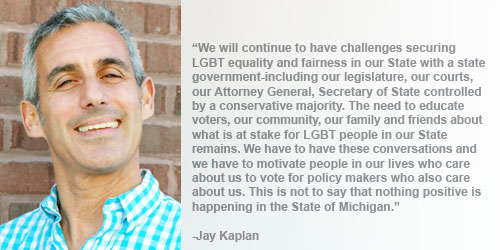By Jay Kaplan

When I look at the current state of Michigan, particularly after this recent lame duck session, I am demoralized and saddened by what this state has become. In addition to the so called Right to Work law and efforts to take away reproductive choice from women, we saw a variety of mean-spirited pieces of legislation that would have permitted adoption agencies and health care providers to discriminate against LGBT patients (among other groups of people) based on so-called religious and moral convictions. Thank goodness the "conscientious objection" bills never made it to a full vote. We will continue to have challenges securing LGBT equality and fairness in our state given that our entire state government (the Governor, the legislature, our courts, our Attorney General, our Secretary of State) is controlled by a conservative majority. The need to educate voters, our community, our family and friends about what is at stake for LGBT people in our state remains. We have to have these conversations with family and friends in order to motivate the people in our lives who care about us to vote for policy makers who also care about us.
This is not to say that nothing positive is happening in Michigan. Last year we saw four communities (Muskegon, Mt. Pleasant, Union Township and Flint) adopt LGBT inclusive human rights ordinances, bringing a total of 20 cities and localities that prohibit discrimination against LGBT people. I think we can expect more communities, like Royal Oak to follow suit, building momentum for an LGBT inclusive civil rights law.
On the National level, things look much more positive and they can potentially benefit Michigan. President Obama was re-elected and he will have the opportunity to appoint judges to the federal bench who are progressive and sympathetic to LGBT equality issues. Last April, the Equal Employment Opportunity Commission, the federal agency that investigates employment discrimination claims, held that transgender employees who have been discriminated against may file a sex discrimination complaint with the EEOC, because gender identity discrimination can be a form of gender stereotyping. Following that decision, the EEOC issued a memorandum that indicated sexual orientation employment discrimination cases may be also handled as sex discrimination complaints, providing for the first time a governmental remedy for LGBT people in Michigan to address incidents of employment discrimination. In addition, the Michigan Department of Civil Rights has indicated that they are on a parallel track with the EEOC and that they intend to investigate LGBT discrimination complaints involving employment, housing, and public accommodations (as sex discrimination), providing redress for anti-LGBT discrimination for the first time in our state. This is huge and unprecedented, and I believe it will be persuasive in getting both our Michigan and federal civil rights laws to finally cover sexual orientation and gender identity.
Of course, most of us are looking to the United States Supreme Court and what it will do with the marriage equality cases it has decided to take. The first case involves a challenge to Section 3 of the Defense of Marriage Act (DOMA), which denies federal recognition to legally married same-sex couples in the United States, which would include IRS tax filings, social security spousal benefits, federal pensions, and citizenship status for binational couples. This section of DOMA has been consistently struck down by federal district courts and in the Circuit of Appeals. I am hopeful that the Court will render this portion of DOMA unconstitutional, which would have allow same-sex couples residing in Michigan, who got married in other states, at least recognition of their marriage by the federal government.
With regards to the Prop 8 California marriage case, there are three possible scenarios. The absolute best scenario for Michigan would be for the Court to decide the question of marriage equality for same-sex couples and of course, to hold that a denial of this right is unconstitutional. This would have the effect of striking down all the state marriage amendments and laws that prohibit gay couples from marrying, including Michigan's. The consensus of many involved in the LGBT legal rights movement is that the Court won't go that far – that they may limit their ruling to the unique circumstances of California (where same-sex couples had the right to marry for six months until that right was taken away through a ballot initiative). The effect of this would be to allow same-sex couples in California the right to marry, and kick the can (the issue of marriage equality for all LGBT couples) further down the road. Another scenario is that the Court could uphold the right of states to deny same-sex couples the right to marry through ballot initiatives, a result that would leave Michigan's amendment fully protected. I personally don't believe that the Court majority will do that – putting itself on the wrong side of history on this issue. Whatever happens in June of 2013, this is, without a doubt, a very exciting time for LGBT rights at the national level and tremendous progress continues to be made on the issue of support for marriage equality. I'm very grateful for these advancements and I only hope that some of this positive momentum will begin rubbing off on our own State of Michigan.










